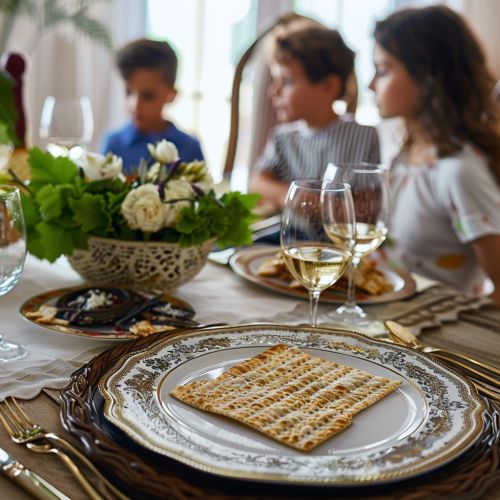Passover
Origins and History
The origins of Passover are traced back to the biblical story of the Exodus, where the Israelites were freed from slavery in Egypt. According to the Book of Exodus in the Torah, God inflicted ten plagues upon the Egyptians before Pharaoh would release his Hebrew slaves, with the tenth plague being the death of the Egyptian first-born. The Israelites were instructed to mark the doorposts of their homes with the blood of a slaughtered spring lamb and, upon seeing this, the spirit of the Lord knew to pass over the first-born in these homes, hence the English name of the holiday.
Significance
Passover is one of the most widely observed Jewish holidays. It commemorates the story of the Exodus, in which the ancient Israelites were freed from slavery in Egypt. Passover is observed for seven days in Israel and for Reform Jews around the world, and for eight days for Conservative and Orthodox Jews in the diaspora. The holiday begins on the 15th day of Nisan in the Hebrew calendar, which falls in late March or early April in the Gregorian calendar.
Observances and Customs
The primary observances of Passover are related to the Seder meal, which is held on the first two nights of the holiday (or only on the first night for Jews in Israel and Reform Jews). The Seder is a fifteen-step family-oriented tradition and ritual-packed feast. The focal points of the Seder are: eating matzah (unleavened bread), eating bitter herbs to commemorate the bitter slavery endured by the Israelites, drinking four cups of wine or grape juice to celebrate their freedom, and the recitation of the Haggadah, a liturgy that includes a narrative of the Exodus.
Food and Drink
The consumption of chametz (leavened bread and other food made with yeast and other leavening agents) is strictly prohibited during Passover. Instead, matzah (unleavened bread) is eaten, a tradition based on the biblical narrative that the Israelites left Egypt in such haste they could not wait for their bread dough to rise. Other foods enjoyed during the holiday include matzah ball soup, gefilte fish, and foods made with matzah meal, like matzah brei and matzah kugel.
In Popular Culture
Passover has been depicted in various forms of media, including films, television shows, and songs. The holiday's themes of liberation and freedom have also served as inspiration for social justice causes.
See Also


